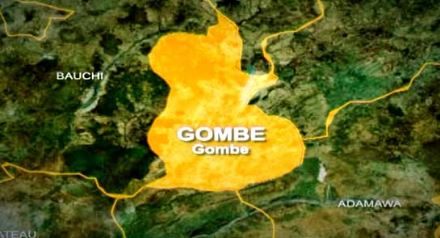The Gombe State Police Command’s apprehension of Joseph Babari, a 27-year-old man, has shed light on the intricate web of mercenary activities and the proliferation of illegal firearms within Nigeria’s volatile landscape. Babari’s arrest, stemming from the unlawful possession of a locally fabricated automatic rifle and eight live rounds of ammunition, unveils a concerning trend of individuals being recruited for illicit activities, fueled by financial incentives and potentially exacerbating existing conflicts. This case underscores the challenges faced by law enforcement in curbing the flow of illegal weapons and addressing the underlying socio-economic factors that drive individuals to partake in such dangerous ventures.
Babari’s confession, revealing his recruitment by an individual identified as Isah, paints a picture of a network operating within the shadows, exploiting vulnerable individuals and contributing to the escalating violence in regions like Bokos Local Government Area of Plateau State. The promise of N180,000 for two months of fighting highlights the desperation that drives some to engage in such perilous activities. It also raises questions about the identity and motivations of the recruiter, Isah, and the broader network he may be a part of. The police’s ongoing investigation aims to unravel these complexities, tracing the source of the weapon and the intended purpose of Babari’s involvement, which could potentially lead to the dismantling of a larger criminal operation.
The circumstances surrounding Babari’s arrest, during a routine stop-and-search operation along the Gombe-Taraba border, underscore the importance of proactive policing and vigilant border patrols in intercepting illegal activities. The discovery of a locally made black vest and a bunch of charms in Babari’s possession adds another layer to the narrative, suggesting a possible belief in supernatural protection or a connection to traditional practices. This element raises questions about the cultural and societal influences that intertwine with criminal activities in the region. The police’s detailed account of the arrest, including the specific time and location, demonstrates their commitment to transparency and accountability in their operations.
The incident serves as a stark reminder of the security challenges prevalent in certain parts of Nigeria, particularly the volatile Plateau State, which has been plagued by inter-communal conflicts and violence. The recruitment of individuals like Babari to participate in these conflicts further destabilizes the region and perpetuates a cycle of violence. The lure of financial gain, combined with the availability of illegal firearms, creates a dangerous mix that threatens the peace and security of communities. The police’s efforts to apprehend individuals involved in such activities are crucial in containing the spread of violence and upholding law and order.
The ongoing investigation into Babari’s case holds significant implications for understanding the dynamics of conflict and criminal networks in the region. Identifying the source of the locally fabricated automatic rifle is critical in disrupting the supply chain of illegal weapons. Furthermore, determining the intended use of the weapon will provide valuable insights into the motivations and objectives of those involved. The apprehension of Isah, the individual who allegedly contracted Babari, could potentially expose a larger network and provide a crucial breakthrough in addressing the root causes of the conflict. The police’s commitment to thorough investigation and their proactive approach to tackling criminal activities are essential in establishing lasting peace and security.
In conclusion, the arrest of Joseph Babari and the subsequent revelations about his recruitment as a fighter highlight the complex security challenges facing Nigeria. The proliferation of illegal firearms, the lure of financial incentives, and the exploitation of vulnerable individuals contribute to a cycle of violence that destabilizes communities and undermines peace. The Gombe State Police Command’s diligent efforts in apprehending Babari and their commitment to a thorough investigation demonstrate their dedication to upholding law and order. The case also underscores the need for a multi-faceted approach to address the root causes of conflict, including tackling poverty, promoting inter-communal dialogue, and strengthening border security to stem the flow of illegal weapons. The ultimate success in achieving lasting peace will rely on collaborative efforts between law enforcement, government agencies, and community leaders to address the underlying socio-economic factors that drive individuals towards criminal activities and perpetuate cycles of violence.


